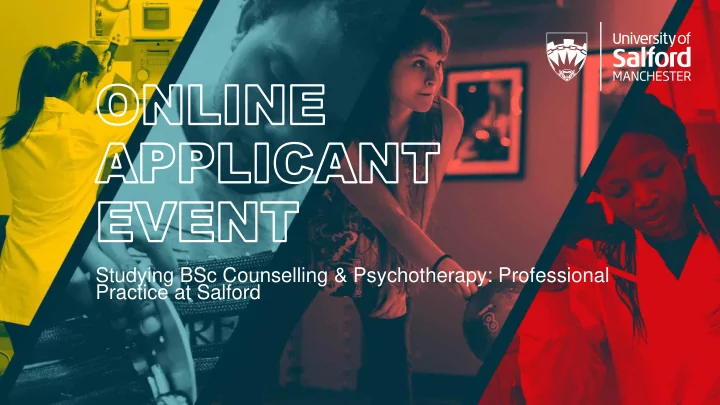

Studying BSc Counselling & Psychotherapy: Professional Practice at Salford
“The curious paradox is that when I accept myself just as I am, then I can change.” Carl Rogers* • Seek to enable greater wellbeing primarily through talking therapies • Area of increasing importance as the need for adequate mental health provision has a higher political profile • A diverse and evolving group of different approaches each with a distinct philosophy / ethos, and practice context.
Counselling and Psychotherapy @ Salford • Our UG & PG programmes primarily focus on Person Centred Counselling & Cognitive Behavioural Therapy • Person Centred Counselling (PCC): fosters a strong therapeutic relationship based on non-directive principles, to enable clients to develop their own insight, resources and capacity for change. • Cognitive Behavioural Therapy (CBT): uses models of how thoughts, emotions and behaviours interact to offer structured approaches to helping clients cope with specific problems in living.
BSc (Hons) Counselling and Psychotherapy: Professional Practice • A programme which, on successful completion, qualifies students to work as Professional Counsellors • Eligible to apply for individual registration with the British Association for Counselling and Psychotherapy (BACP) • Able to apply for higher level BACP accreditation (after gaining post qualifying experience) • A professional training in Person Centred Counselling, includes a foundation module in CBT
A Degree of Curiosity… • Who am I? • How have I become the person I am? • How do I relate to other people? • Who do I want to become? Image • How can I make positive changes in my life? • What do I want out of life? • How can I help other people find out all of the above?
Entry Requirements • GCSE English & Maths at C – (or equivalent including Level 2 Functional Skills) • Level 3 = 112 UCAS Tariff Points • A level BBC (General Studies and AS levels usually not accepted) • BTEC DMM • Access to HE • Salford Alternative Entry Scheme – for those with above GCSEs or equivalent and relevant life experience but no other qualifications. • Experience of helping others: ideally through voluntary or paid work (rather than only in social contexts e.g. helping friends & family) • Ability to reflect on your own experience and personal development (emotional literacy)
Teaching Context • All modules delivered by experienced Counsellors and Psychotherapists currently in practice • Real world research – at the leading edge of the profession
Teaching and Assessment in Practice • Teaching: You DO work • Lectures / seminars hard but it’s • Skills practice groups not all books and theory • Personal development groups • Workshops • Assessment: • Written assignments / presentations • Live assessments / recordings • No written exams • Final year practice portfolio
Themes & Modules Year 1 Year 1: Year 1: Therapy, Ethics & Counselling & Human Rights Psychotherapeutic Theory Ethics Approaches Year 1: Counselling Philosophy & Research Year 1: Counselling & Reflection Psychotherapy Skills & Practice Personal Development Year 1: Counselling & Communication Skills Year 1: Mindfulness & Wellbeing
Themes & Modules Year 2 Consolidation Year 2: Year 2: Professional Theory Of Counselling Issues, Ethics & & Psychotherapy Supervision Theory Ethics Year 2: Year 2: Professional Personal & Counselling & Professional Psychotherapy Skills Development 1 Reflection & Year 2: Preparation for Practice Year 2: Practice Based Counselling & Reflection & Research Personal Psychotherapy Practice Development
Themes & Modules Year 3 Reflective Practice and Development Year 3: Year 3: Group and Counselling & Mental Individual Practice Health Theory Ethics Supervision Year 3: Professional Year 3: Practice Placement Personal & Professional Development 2 Year 3: Professional and Reflective Log Reflection Year 3: Theoretical & Practice Studies Route : Personal Dissertation Development Year 3: Cognitive Behavioural Therapy (CBT) Skills
Employability • Counsellors work in: • The NHS (Well-Being practitioners within IAPT / other primary care settings) • Charitable / Third Sector • Occupational Health Counselling • Employer Assistance programmes • Schools and Colleges • Private practice • Many types of employment value skills in: • understanding behaviour • communicating effectively • motivating or supporting others
Employability • DLHE data 2016-17: (most recent available) 6 months after graduation: 92% in employment or further study 68% in highly skilled employment
Progression • Post graduate training, e.g: • MSc Advanced Counselling and Psychotherapy Studies • MSc Cognitive Behavioural Psychotherapy • MSc Social Work • Other specialisations
We aim to… • Treat students with respect • Support them to pursue their personal goals • Relate to them as individuals • Provide quality teaching • Provide clinical supervision from qualified and experienced supervisors • Welcome students’ views, and their contributions to the counselling community.
To see what other presentations are available today, please go back to our event hub
Recommend
More recommend